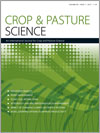Digitaria insularis (sourgrass) is a weed problem emerging in importance in agricultural fields from the north of Argentina and has recently been reported as resistant to glyphosate. Understanding the germination of local biotypes of D. insularis could help to reduce invasion and improve the long-term management strategies for this weed. The objective of this work was to study the effect of environmental factors on germination of D. insularis seeds from two different populations of Argentina. Three experiments were performed in germination chambers by using recently dispersed seeds. Seeds with or without pre-chilling treatments had 95% germination, suggesting the absence of dormancy in freshly harvested seed. Germination at constant temperature of 25°C was ∼55% lower than germination at fluctuating temperature of 20°−35°C. At constant 25°C, germination was higher for seeds from Santiago del Estero than seeds from Córdoba, and as the number of hydration–dehydration cycles increased. Germination was reduced with exposure to far-red light for 1 h. Any crop management decision that reduces soil thermal fluctuations and/or far-red : red ratio (such as stubble or cover crops) could reduce seedling field emergence for this species.
How to translate text using browser tools
31 January 2017
Response of Digitaria insularis seed germination to environmental factors
F. H. Oreja,
E. B. de la Fuente,
M. E. Fernandez-Duvivier
ACCESS THE FULL ARTICLE

Crop and Pasture Science
Vol. 68 • No. 1
February 2017
Vol. 68 • No. 1
February 2017
environmental factors
grass weed
management decisions
seed origin
seedling emergence




